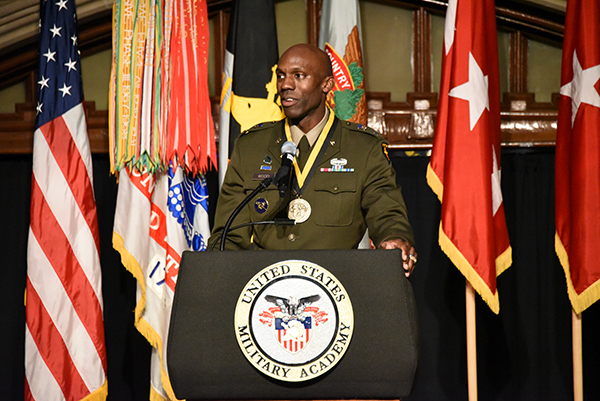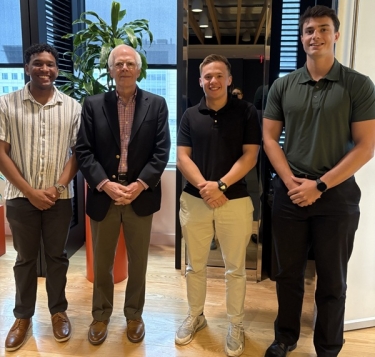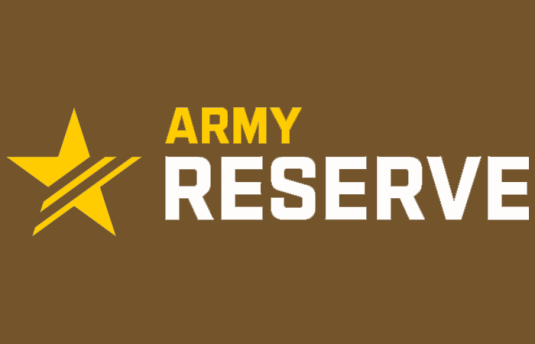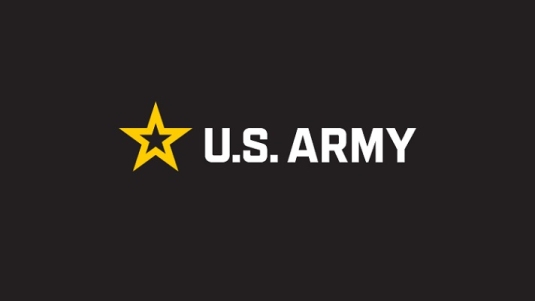At a ceremony in the Mess Hall on October 25, 2023, Lieutenant Colonel McKinley Wood (USAR), Class of 2001, accepted the 2023 Alexander R. Nininger Award for Valor at Arms. The Nininger Award is named in recognition of the heroic actions of Second Lieutenant Alexander R. Nininger, Class of 1941, and is funded by a generous endowment from E. Doug Kenna Class of 1945 and his wife, Jean.
Wood, a self-proclaimed mediocre cadet, described his struggle to get through West Point academically in his address to the Corps of Cadets. His speech emphasized his “I will never quit” and “I don’t know how to quit” attitude.
As an active-duty officer, Wood was deployed to the Middle East three times and served as a tank platoon leader, company executive officer, and battalion maintenance officer. On April 6-7, 2003, then First Lieutenant Wood displayed conspicuous gallantry and intrepidity in action against the enemy while serving as the leader of 3rd Platoon, Company A, 2nd Battalion, 69th Armor Regiment, 3rd Infantry Division in support of Operation Iraqi Freedom. According to the citation for the Silver Star he received for his actions on these dates, “With complete disregard for his own personal safety, First Lieutenant Wood repeatedly exposed himself to intense and accurate enemy fire while directing his platoon’s fires and maneuver…His heroic efforts resulted in the destruction of numerous enemy tanks, APCs, and RPG teams during the attack to isolate Baghdad.”
Wood is a Fellow of the Georgetown Washington School of Foreign Service (Diplomacy) and will be featured on a future WPAOG podcast in November.
Speech
Sir/Ma’am/Cadet, thank you for the gracious and humbling introduction. LTG and Mrs. Gilland, Mr. And Mrs. Mark Bieger, distinguished guests, friends, and family, the Corps of Cadets, I am truly honored to be this year’s Alexander Nininger Award recipient.
I was shocked when I received a telephone call informing me that I was awarded the 2023 Nininger Award. I was returning to my apartment in D.C. after a thorough mental agility test discussing U.S. Diplomacy and Statecraft at Georgetown. Knowing who Alexander Nininger was in the history of our Long Gray Line and his willingness to give his last full measure, I thought I was getting someone else’s notification call. Nevertheless, I was assured that I was the correct person. My surprise also showed me that I was out of practice with the tactical proficiency that Amor Officers are known for. We should NEVER be surprised by any situation. I’ll leave that to the Infantry.
There are three things I would like to touch on while I am here before you, and these are my three topics for tonight. First, I want to give you my take on what foundational trait helped me graduate from West Point, serve as a leader and follower in our Army, and become successful in corporate America. Second, I’ll give you my definition of “Never Quitting” vs. “Not Knowing how to Quit.” Finally, I’ll briefly summarize the events that placed me before you this evening using a simplified version of combat rules. Hopefully, if you are still awake, we will leave this place in good spirits, a little wiser, so we can get enough rest to BEAT THE HELL OUT OF UMASS on Saturday!
As you all have experienced by now, being a Cadet at West Point takes an exceptional person. As your class years develop into a cohesive cohort, the closer you get to graduation, you will realize that one of the most valuable lessons anyone can absorb at the Academy is how to learn. Every expert has a beginning; every genius in your calculus class has experienced that blank stare into space on a final exam before joining the Corps. Everyone in gray here tonight will develop into an avid learner and develop the skill to learn new things. As a Plebe and Yearling at West Point, I struggled with academics. I considered myself an academic rock during my first years at West Point. In math, I struggled to understand the role of a predicate in a formula; in English, I never understood what a derivative even meant… wait, I think I got those backward.
As I developed with my class and pursued the dream of graduation, I began to understand the trick for my success; figuring out what techniques, tactics, and procedures (TTPs) made sense to my brain. Simply learning by reading and mimicking was not for me. I had to LIVE the problem set or passage in a book. For me, being there in the moment made the experience of academic absorption real. When I better understood myself and how I understood the world, it was the moment I learned how to learn. There are some of you in this mess hall tonight who have this same learning block as I did some 20-plus years ago; wow, I’m old! And you have not yet gotten to the point when I determine that a long deep look at myself, being honest and evaluating my personal facts and truths. It was not a matter of memorizing functions, poetry, rules, or grammar. It was placing myself in the moment. Here is an example; WW II battleship turret guns were able to hit their targets 20 miles away. How? Differential calculus. During the Normandy invasions on June 6th, 1944, when our American and Allied troops were being killed on the beach, I imagined myself as the guy developing the firing solution for those canons so I could double-check the rangefinder. One mile short and it is fratricide; on target and I get a pat on the back, one mile long and I just wasted a shell the size of a Volkswagen Bug. Yes, I know, nerdy example, but it worked for me, and it placed me in the moment. Even today I place myself in the shoes of the Ambassadors, Senior civilian Diplomatic Officers, and our own military Foreign Service Officers when we discuss topics I never studied before. I try to understand their thought processes and evaluate if I would make the same decisions. Deciding how to best implement the elements of power to avert a shooting war or bring someone home.
So, I told you how I struggled my first two years at the Academy, and I am sure the Dean is going to go into the records tomorrow morning and see how badly I struggled. Sir, I’ll save you the time; it was bad enough to stay at the academy for 2 summers. This brings me to my second topic. How many people do you know that tell you or themselves to Never Quit? It is a term that is familiar to all. We tell our friends when studying for term-end exams to never quit. We all have run next to our classmate or another Soldier on the PT test and tell them not to quit even when they have run out of time. But how many people do you know tell you they do not know how to quit? Giving up on something that has even the slightest chance of success does not even occur to that person’s spirit, or that person knows that giving up is a pain worse than death. I recently told a classmate of mine this very thing about myself during a podcast when he asked what a key motivator for me was at the Academy. I told him that both a blessing and a fault of mine was that giving up through choice was something I did not know how to do. I would also argue that Lieutenant Nininger displayed this same trait when he repeatedly pushed forward into the heart of the enemy, seeking their destruction, and safeguarding his Soldier’s lives, not once displaying regard for himself. Not knowing how to quit on his friends, comrades, and Soldiers resulted in Lieutenant Nininger’s death. When US forces recaptured the area where he died, he was surrounded by the enemy. Getting to the point I previously spoke of about learning how to learn took only a fraction of the dedication that Lieutenant Nininger displayed in the Philippines. I got to the point of my own personal path of success by not knowing how to quit and knowing that graduation from West Point was a prize worth attending. I would challenge everyone in the Corp of Cadets today to try and define what quitting means to them at a deeply personal level. If you are not able to come up with an answer quickly, you might be the type of person who does not know what quitting is. If you are able to define what quitting means to you, do worry, you have defined the problem set and found half the solution. Even in class, you’ll get some credit for a partial solution. You will only need to execute the answer.
Last, I want to share with you some simplified rules of combat; related to combat actions from April 2003. My Battalion Commander at the time, Jeffery Sanderson, named these rules of combat after our battalion, Panther. The Panther Rules of Combat are: 1) See the enemy before they see you. 2) Make contact with the smallest element possible. 3) Fire distribution and control. On April 5th my tank platoon received orders to establish a blocking position in Northwest West Baghdad to facilitate the capture of the international airport. There were two problems I saw with this order. The first one was we were located at the time south of Baghdad (joke). The second problem I saw was the only way to attack our objective was a penetration; basically, the Battalion would be in a column with the minimum amount of firepower forward attacking prepared defenses of militia, regulars, and Republican Guard enemy Soldiers. Oh well, Orders are orders. Let’s rock and roll. The first rule of combat; see the enemy before they see you. As we proceeded with our attack on April 6th in a column, my tank platoon conducted a forward line of passage with the Scout Platoon. In front of us was weapons-free. The first sign of the enemy was an enemy Soldier walking out of a building with their rifle slung across their back and walking away from us. The first rule of combat was accomplished; let all hell rip loose! As we engaged the Soldier with machine guns, all his buddies streamed into the street with arms at the ready. To the enemy combatant’s surprise, a heavy battalion of M1 tanks and M2 Bradley Infantry Fighting Vehicles bore down on them. As we proceeded to slice our way through their defensive line, the second rule of combat began to apply. We dictated the fight’s tempo since we caught them with their eyes closed.
Make contact with the smallest element possible. Being at the head of the column with my Alpha section forward about 500 meters allowed the Company and Battalion commanders to not let the enemy decisively engage our entire Battalion creating the ability to maneuver. As my wingman and I engaged infantry, personal carriers, command tracks, and the occasional T-55 or T-72 tank that decided to try their luck, the Task Force commander could develop options to force commitment. I’ll tell you what in the wind feels like, waiting for the commander to commit additional firepower for two tanks in a city with enemies all around. It. Felt. Awesome…ly lonely. By this time, You may think American Soldiers can’t simultaneously shoot, move, and protect equally. My brothers and sisters that day in the attack proved it can and was done. We never stopped moving, we never stopped killing, and we never stopped reporting.
The final rule of combat, fire distribution and control, came in the form of the lead tanks, mine and my wingman, gunners engaging the enemy in the city at distances of 800 meters and closer. Tank commanders were exposed in their hatch with M4 rifles and M68 grenades protecting the tanks from the enemy Infantry. Anyone we bypassed, well, they got a chance to say hello to the rest of the Task Force and the mounted Infantry. Giving the command “Fire and Adjust” to the gunners allowed them to select targets and service them how they saw fit. As the Platoon Leader, it was my job to see where every person and barrel was pointing visually, no matter how many high-speed bumble bees (AKA bullets and RPGs) searched for my head. I knew the sooner we destroyed the enemy, the higher the chance of our survival. Only a couple of brave enemies attempted to climb on my tank, only to be seen by me and my rifle. As a Battalion, fire distribution and control manifested in those behind the lead elements not servicing the same vehicle twice. The funning thing about SABOT rounds is they go through the enemy and keep going for a long way. By allowing as much destruction as possible to be dealt by 1/3 of the Battalion, the Task Force commander ensured we would have ammunition once we reached our objective. That night, as multiple counter attacks continued from 3 sides, we continued to repulse the enemy with accurate and deadly fire using the wingman concept where one tank sights, identifies, and directs the target while the other tank kills it. In the morning, when I was ordered to probe the enemy position that was on the other side of a partially blown-up bridge with the remnants of of last night’s work. My Alpha section proceeded across using the same sense and shoot techniques against any surviving infantry and armor. Too bad I did not recognize that enemy sappers rigged the bridge. That probably shortest counterattack in the history of our Army!
So, to those who are still awake, I leave tonight you with some of my experiences as a Cadet and an Officer in our great Army. The knowledge that is okay to be a rock at West Point and work your tail off. To look deep within yourself and know that you have what it takes to never quit or be like me and not know quitting is an option. West Point is a great institution to be from, though it might not feel like it now. You will look back on how hard life is at the Academy AFTER you graduate. Finally, the Rules of Combat; See them before they see you, make contact with the smallest element possible, and fire distribution and control. I can hope that last point you will never have to put into practice, but our Army exists because enemies of Democracy and freedom don’t know how to quit either.
With that, I thank you all for your time, your continued dedication, and your sacrifice for our families and our Nation. Go Army, Beat Navy!
Photos
Announcement
September 25, 2023
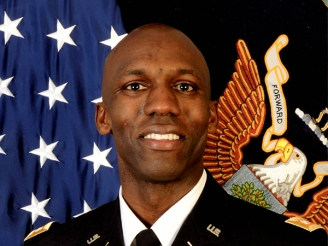
West Point, NY: The West Point Association of Graduates is pleased to announce that Lieutenant Colonel (USAR) McKinley Wood, Class of 2001, has been selected to receive the 2023 Alexander R. Nininger Award for Valor at Arms, which will be presented on October 26, 2023, at West Point, New York.
Between April 6-7, 2003, then First Lieutenant Wood displayed conspicuous gallantry and intrepidity in action against the enemy while serving as the leader of 3rd Platoon, Company A, 2nd Battalion, 69th Armor Regiment, 3rd Infantry Division in support of Operation Iraqi Freedom. According to the citation for the Silver Star he received for his actions on these dates, “With complete disregard for his own personal safety, First Lieutenant Wood repeatedly exposed himself to intense and accurate enemy fire while directing his platoon’s fires and maneuver…His heroic efforts resulted in the destruction of numerous enemy tanks, APCs, and RPG teams during the attack to isolate Baghdad.”
In addition to his Silver Star, Wood’s military awards include the Presidential Unit Citation, Combat Action Badge, Meritorious Service Medals, Army Commendation Medal, Army Achievement Medal, Armed Forces Expeditionary Medal, Iraq Campaign Medal with Campaign Stars, Global War on Terrorism Expeditionary and Service Medals, National Defense Service Medal, Army Reserve Service Medal, Army Service Ribbon, and the 69th Armor Regiment Affiliation.
Wood holds primary and advanced degrees in engineering and project management, respectively. His military education includes the Armor Officer Basic Course, Scout Leader Course, Maneuver Captain Career Course, Army Ground Safety Officer Course, Master Resiliency Trainer Course, Intermediate Level Education Common Core, Advanced Operations Course, Inspector General Basic Course, and Defense Strategy Course. As an active-duty officer, Wood was deployed to the Middle East three times and served as a tank platoon leader, company executive officer, and battalion maintenance officer. With the National Guard, Wood served as a brigade liaison and fire support officer. Finally, as a Reservist, Wood served as assistant G3, Army School System Commandant (80th Training Command,) command safety officer, transportation battalion executive officer, and detailed inspector general.
Wood is a Fellow of the Georgetown Washington School of Foreign Service (Diplomacy), and he recently served as the battalion commander of 3rd Battalion, 304th Infantry Regiment providing weapons, tactical employment of crew-served weapons, and physical confidence training to the United States Corps of Cadets at the United States Military Academy at West Point.

